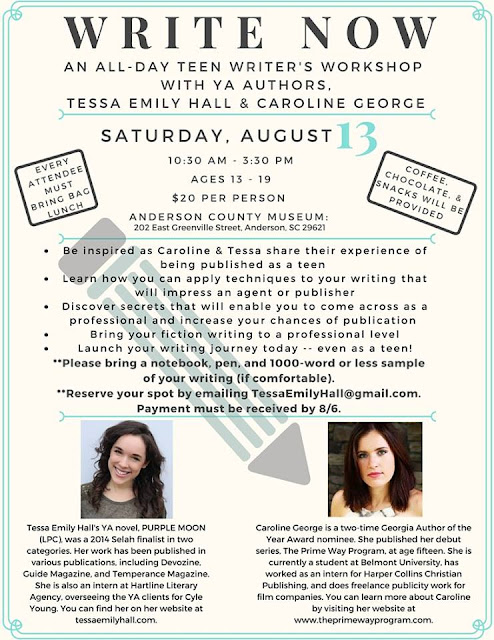Have
you written a book?
Are
you looking for an agent?
As a two-time self-published
author now signed with Hartline Literary Agency and past intern of Harper
Collins, I have experienced the pros and cons of both traditional and
nontraditional publishing.
In this blog post, I will
share what agents don’t tell you and offer tips on how to land a contract with
an agency.
Agents are the real-estate agents of publishing,
acting as the “middle-men” between sellers and buyers, authors and publishers. They
add credibility to manuscripts, reducing publishers’ slush piles to a few thousand
proposals.
The
best ways to land an agent:
Since the emergence of
literary agencies, there has been a standard process for querying. Writers send
their pitch letters, sometimes the first few pages of their manuscript, to agents and
wait up to six-months for a response. If an agent is interested, the author then
sends more of the manuscript. This process continues until the interested agent
reads the whole book and offers a contract.
Pros of the system:
Agents are able to weed out books that aren’t ready for the market, and authors
have the ability to query as many agents as desired.
Cons of the system:
Many queries and manuscripts are left in an agent’s slush pile, some never to
be examined. Those reviewed are strictly analyzed and refused if the structure,
word count, etc. are less than optimal. This denies writers the chance to fully
present their writing and the marketability of their work.
With such a systematic
process in place, how can writers raise their chances of landing agents?
Conferences
offer
a unique opportunity for writers to have face-to-face interaction with agents
and other professionals within the publishing industry. Often, writers are able
to schedule time with the faculty to pitch their books. Agents can then put a
face to a query letter and are more likely to select the book for
representation.
Secret . . .
The key to a successful
pitch isn’t scheduling time with an agent and delivering a top-notch hook; it
is the connection fused between the writer and the agent.
Tip . . .
When you attend a writers’
conference, focus on genuine relationship building. Connect with other
writers and publishing professionals. This will allow you to show your
marketability, your book’s overall potential, and most importantly, give you
the chance to learn. Ask questions. Listen to what others have to say. Apply
the advice presented to you.
By networking, you unlock
the second and most secret way to landing an agent.
Word-of-Mouth
is a method rarely mentioned by agents but has proven the most successful for
me. I pitched at a writers’ conference in New York City and queried over a
hundred agents, but I didn’t land a contract with an agency until my close friend,
who I met by inquiring about a book review, referred me to her boss/agent.
Because of her recommendation, my query was raised to the top of the slush pile
and given more notice.
Remember: Who you know is everything.
Build your platform. Befriend
others who are more and less experienced. You never know which conversation over
a cup of coffee will gift an opportunity.
How
to make yourself more appealing to agents:
Professionalism is candy
to an agent. When you query, send a proposal, and generally communicate, make
sure to be well-informed and respectful. Nothing is more of a turn-off than a
sloppy proposal and a nagging, ignorant author.
Do your research—everything
you need to know about the submission process can be found online. Edit your work,
even your emails. And please, be educated on the publishing industry and
current marketplace.
Tips . . .
An agent’s job is to shop
your book to publishers, making them your business partner, not your teacher,
editor, and confidant. Respect their time and workload, and they will respect
you.
Platform
is number-one priority to publishers, which gives it extreme importance to
agents. Books are a dime-a-dozen, so make your book more than a book. Give it
backing. Create a brand for yourself by blogging, being active on social media,
etc. And formulate a viable, creative marketing plan for your book.
To express your dreams,
you must first express yourself. Readers are more likely to buy a book if they
have a connection with the author.
In conclusion, agents and publishers aren’t the formula of a
bestselling book, rather they’re the projectors showing your masterpiece on an
international screen. You are your book’s greatest advocate. Once you relinquish
reliance on the standard system and fight to make your work an asset to the
publishing industry, you find your place within it.
Authors, self-published and
traditionally-published, are entrepreneurs. Those who treat their writing as a
business stand more of a chance at achieving success.


